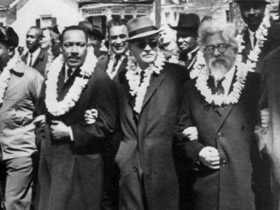They crossed the bridge again today.
Fifty-four years ago this week, March 7, 1965, the marchers in Selma, Alabama crossed the Edmund Pettus Bridge to demand equal voting rights. Today, March 3, 2019, some of the original marchers, led by Congressman John Lewis, joined a new generation in crossing that bridge once again, in celebration of a victory and in recognition of work yet to be done.
Among those original marchers was Rabbi Abraham Joshua Heschel, a friend to Dr. King, who remarked afterward to his daughter, “Legs are not lips and walking is not kneeling. And yet our legs uttered songs. Even without words, our march was worship. I felt my legs were praying.”
The year before the march in Selma, Rabbi Heschel spoke before a meeting of the American Medical Association, as part of a discussion entitled, “The Patient as Person.” Heschel spoke as reverently of medicine at that conference as he did of the work being done in Selma the following year.
“The Mother of medicine is not human curiosity,” he declared, “but human compassion.” The essence of humanity, Heschel believed, and particularly of medicine, was caring. “What constitutes being human, personhood? The ability to be concerned for other human beings.”
Mutual concern was so important to Heschel that he felt that its absence might endanger the whole enterprise. “Without a sense of significant being, a sense of wonder and mystery, a sense of reverence for the sanctity of being alive, the doctor’s efforts and prescriptions may prove futile.”
Reading this essay today fills me with a sense that when I go to work in the morning, my stethoscope is praying. My eyes peering into an ear canal are praying. My fingers carefully defining the edge of an enlarged liver are praying. My heart, breaking at the expression of suffering that someone entrusts to me, is praying.
And yet Heschel already saw the seeds of the crisis we are in today, as the unique trust and reverence medicine used to enjoy among the professions had begun to erode. “While medical science is advancing,” he observed, “the doctor-patient relationship seems to be deteriorating.” He saw medicine suffering from what he termed a “spiritual malaria,” a disease in which the patient becomes nothing more than “a human machine in need of repair . . . an ingenious assembly of portable plumbing.” And if that’s the case, then the doctor bec0omes nothing more than a plumber.
Apparently spiritual malaria is not completely fatal, because medicine is still suffering from advanced stages of this disease fifty-five years after Heschel first pronounced the diagnosis. We survive despite ourselves, despite the self-inflicted wounds of dehumanizing, impersonal, fragmented systems of care, because individual healers still pray with their fingers and eyes and stethoscopes and hearts. They pray in the language of narrative medicine, and of community health centers, and of direct primary care, and of advocacy. They pray by pushing back when the system pushes them around.
The prayer they are saying goes like this: “Character is shaped by experiences of quality, particularly by what we come upon in times of anxiety. A patient is a person in crisis and anxiety. Few experiences have such a decisive impact on our ability to understand the meaning of being human as the way in which the doctor relates himself to us at such times.”
Blessed are you, Ruler of the Universe, who has gifted us with the opportunity to feel concern for and offer healing to our fellow human beings.
Heschel’s address from “The Patient as Person” is available for purchase in full text through the Rabbinical Assembly or in Heschel, A.J. The Insecurity of Freedom: Essays on Human Existence. New York: Schocken Books, 1972. pp. 24-38.
